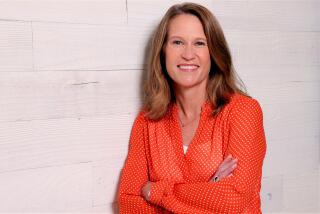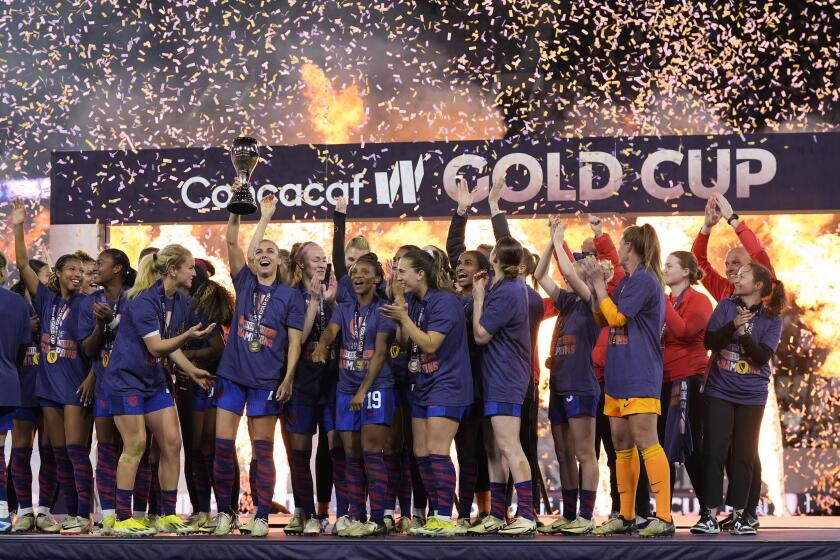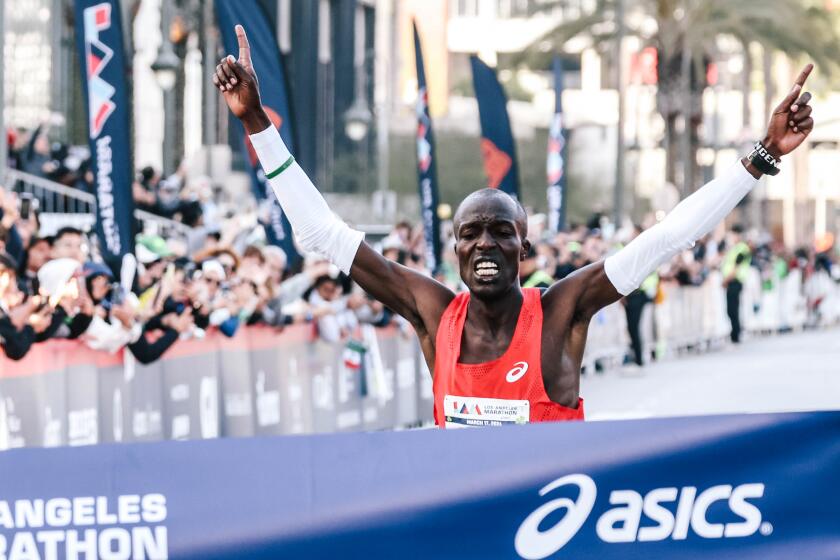London Olympics organizer emphasizes women’s roles
Sebastian Coe, chairman of the organizing committee for the upcoming London Olympics, wasn’t merely catering to his audience Friday at the International Olympic Committee’s conference on Women and Sport when he said women should be represented at every level of sports.
Coe practices what he preaches, working alongside an array of women in senior positions at LOCOG, as the London organizing committee is known. Women serve as LOCOG’s director of strategic programs, director of sport, general counsel and human resources director, all key responsibilities.
Coe, twice an Olympic track and field gold medalist in the 1,500 and twice a silver medalist in the 800 for England, told delegates to the three-day conference at the JW Marriott in downtown Los Angeles that it’s by design that half of the London organizing committee’s 3,000 members are women.
“It is absolutely essential that an organization reflects the communities it works in,” he said during a presentation about leadership views on women in the world of sport.
Including women at high levels “is not a ‘nice-to-have.’ It’s absolutely essential for the proper governance of an organization,” he said.
Anita DeFrantz, chair of the IOC’s Women and Sport Commission and a U.S. Olympic rower in 1976, applauded Coe’s dedication to diversity. “I’m delighted,” DeFrantz said, “and I guess I could only say, ‘What took so long?’”
Female athletes made up 42.4% of athletes in the 2008 Beijing Summer Games and 40.7% of athletes in the 2010 Vancouver Winter Games but are few within the IOC and national and international decision-making bodies. Three nations — Saudi Arabia, Qatar and Brunei — have never sent a female athlete to the Olympics.
The best result from this gathering, DeFrantz said, “is that there’s not a question ever asked again” about women’s participation on the field of play or as executives.
“Indeed for all of us, sport is a birthright,” she said. “We can all contribute to the world of sport, and we have to have the best minds working on behalf of sport.”
This conference, which drew about 800 delegates from 140 countries, was designed to share information about the educational, economic and legal opportunities available to get girls and women involved in sports and allow delegates to put these ideas in practice in their homelands.
“But I also hope we’ll find a way to understand this kind of last barrier that seems to be in place preventing women from seeking the positions of responsibility,” DeFrantz said.
She said women often confront a “fear barrier” that discourages them from vying for executive positions because they’re not accustomed to losing and don’t realize defeat shouldn’t deter them.
“Are these the things that keep women from standing for election? Whatever it is, we need to expose it, understand it and make it go away as a barrier,” she said.
Coe, who returned to London on Friday, said preparations are about 95% done in the main Olympic Park complex. The Games will run from July 27 through Aug. 12.
“All our permanent venues are completed. We’ve still got a lot of temporary venues to build. We’ve still got a lot of operation integration,” said Coe, who planned to attend a cycling test event this weekend and a swimming event next weekend.
Also at the conference, Ann Stock, assistant secretary of the U.S. State Department’s Education and Cultural Affairs Bureau, announced the launch of a State Department program that will bring female sports leaders to the U.S. to learn about sports management. The Empowering Women and Girls through Sports Initiative will also send U.S. athletes overseas to teach leadership skills.
twitter.com/helenenothelen
More to Read
Go beyond the scoreboard
Get the latest on L.A.'s teams in the daily Sports Report newsletter.
You may occasionally receive promotional content from the Los Angeles Times.







